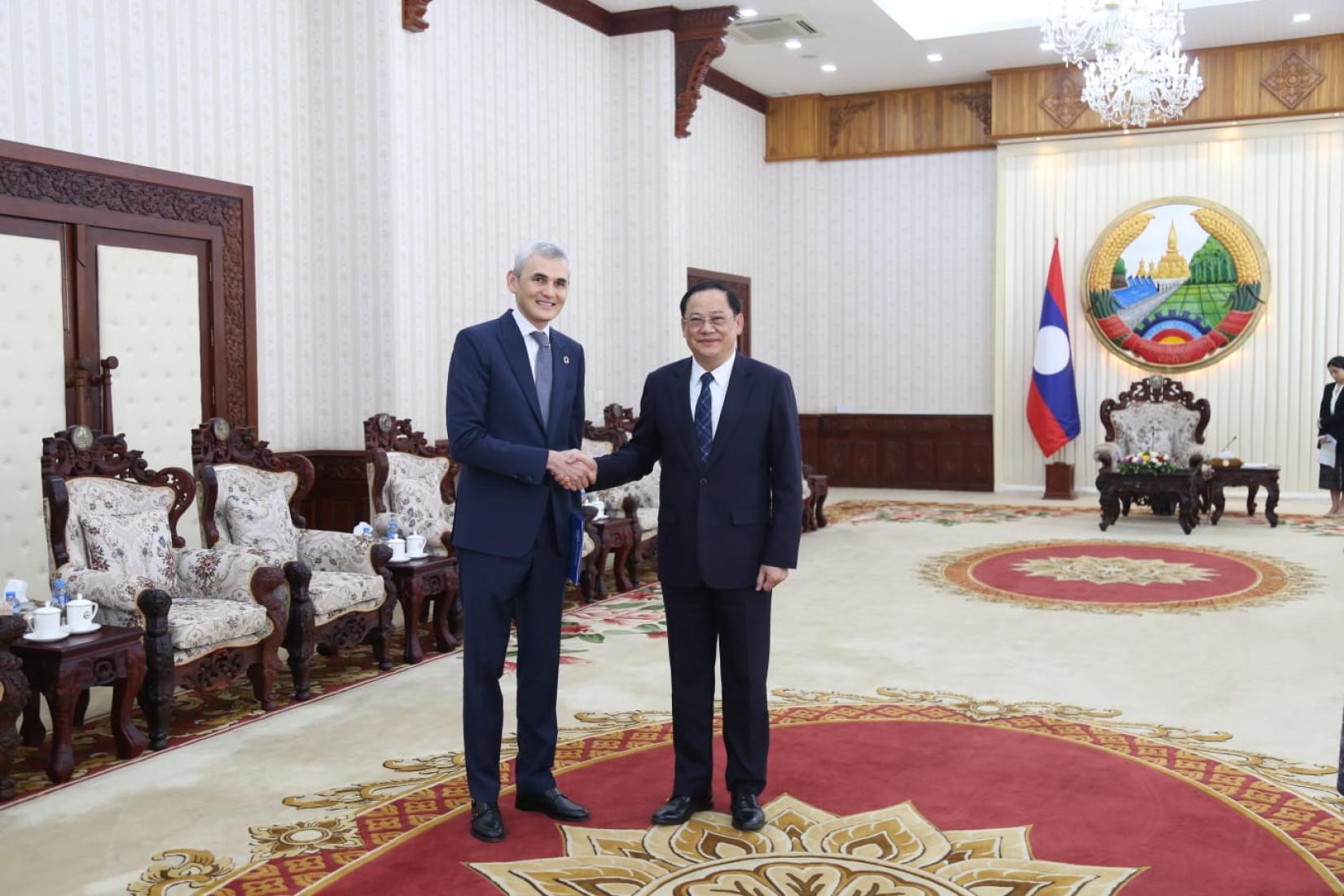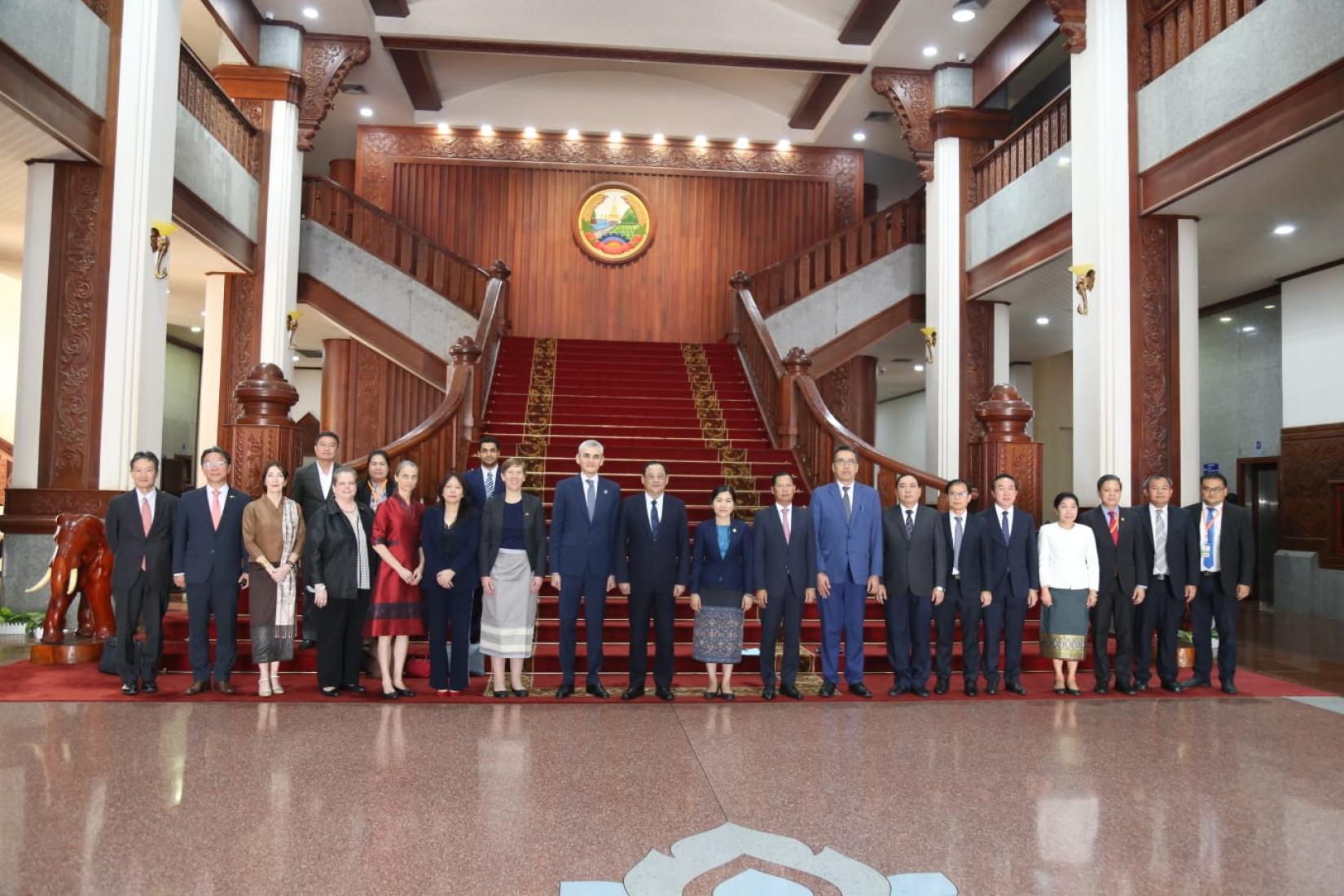Remarks at the debrief with the Prime Minister on the RTIM
2023 Round Table Implementation Meeting
Debrief with H.E. Mr. Sonexay Siphandone, Prime Minister of Lao PDR

Check against Delivery
Thank you, Excellency, for taking the time to meet with us to debrief on the outcomes of the recent Roundtable Implementation Meeting.
As co-chair of the RTIM, it is my pleasure to add to MPI’s summary on behalf of all of the development partners that engaged in the Meeting, so please take these points as reflecting the many interventions made during the day by a wide range of partners. In attendance today, we have some of the Ambassadors and Heads of Missions who had key roles in the Roundtable Meeting.
Development partners greatly appreciate the value of the Round Table Process as the principal inclusive platform that brings us together to discuss the most pressing development issues facing the country.
This year in particular, we would like to acknowledge the efforts taken by MPI to structure the meeting to create more space for substantive exchange. The discussions, including two parallel sessions, brought forward some clear and constructive recommendations.
This is a very important year for the country, during which we reflect on the findings of the Mid-Term Review of the 9th NSEDP for the priorities during the remaining years of the Plan, and for the development of the 10th Plan, which will run through to the 2030 deadline for achieving the Sustainable Development Goals.
The country is also moving steadily towards the anticipated date for LDC graduation, with the UN committee for Development Policy recently confirming that the country continues to meet the readiness criteria, but also flagging for the need for some actions to ensure graduation is smooth and successful. With the national Smooth Transition Strategy now endorsed, it is important to rapidly shift gears to full implementation and monitoring of efforts to complete the planned actions and make full use of the less than 2 years until graduation.
With that in mind, allow me to structure my summary of the Roundtable Meeting in two parts:
9th NSEDP Recommendations
Firstly, with regards to the implementation of the 9th NSEDP:
As set out in the Mid-Term Review, it remains urgent to redirect and strengthen efforts to address the economic and financial difficulties facing the country. This was discussed in detail in one of the two panel sessions, noting the following:
- The Macroeconomic Reform Roadmap proposed by the ADB and World Bank to support the implementation of the National Agenda highlights prioritized steps and concrete actions to help us achieve this objective.
- The Financing Strategy for the 9th NSEDP, which Your Excellency approved last year, is closely aligned with this, and its speedy implementation will help maximize the resources available for the Plan.
- The root causes of the economic and financial challenges that the country is facing will require active policy decisions to remedy. As the economic performance of neighboring countries indicates, external factors are not the main cause of the economic difficulties. An improvement in the international economy and higher rates of growth alone will therefore not be sufficient to address the scale of the debt burden
The quality of growth is a crucial issue, which involves improving the investment climate, encouraging diversification of production, creating more job opportunities, boosting public investment, fairly distributing social benefits, and managing the trend of outward migration.
The Round Table Meeting emphasized that whilst taking steps to address these difficulties, we must also ensure compatibility with Lao PDR’s important environmental objectives.
Climate change effects are felt in many ways including agricultural production, biodiversity preservation, energy generation and livelihoods that depend on land, water and forests.
The country is blessed with rich natural resources that can play an invaluable role in supporting national development. But protecting and nurturing these requires integrating environmental considerations into how core economic decisions are made, and how different types of investment are promoted.
Addressing these challenges is crucial for fostering sustainable development and ensuring a resilient future for communities and the environment they live in. Based on the discussion, five recommendations were made for the remaining period of the 9th Plan:
- Urgently increasing revenue mobilization and monetary stabilization, including returning VAT to 10 percent with the same coverage as before, and restructuring taxes on luxury items, alcohol and tobacco; these reforms could raise GDP by 2 percent.
- Applying the principles of competitiveness and transparency to public-private partnerships and concessions, which have played a key part in current macroeconomic difficulties;
- Implementing measures for the restructuring of bilateral debt;
- Applying more rigorous bank supervision to address the risk of bank failure; and
- Increasing spending towards the social sectors to ensure education, health and social security are adequately resourced for equitable impact.
There was a very strong consensus during the meeting on the need to take urgent action to invest in human development, in particular in health and education. This was discussed in detail in the second panel session during the RTIM.
One of the challenges is that of inequitable access to education and social services, especially for the poor and vulnerable populations. This is exacerbated by low pre-school enrolment and student performance, as well as increasing drop-out rates. Improvements in nutrition and health indicators such as underweight and stunting among children below age 5 are reversing, and we are falling short of the target of 95% for the national health insurance coverage. The quality and coverage of existing services need scaling up, too.
Gains made over the past 20 years need to be preserved, since without food and nutrition security, there can be no sustainable human development. Expansion of existing nutrition and food security programs should be accelerated with attention to addressing bottlenecks such as capacity to implement at scale, resourcing, intersectoral coordination and institutional governance.
Low-income households and informal workers, who often resort to irregular migration pathways, also face limited social protection coverage, contributing to financial insecurity. Furthermore, violence against women and children, and early marriages, pose significant threats to community well-being.
During the discussions on human capital, two specific recommendations were made for the remaining years of the 9th NSEDP:
- First, in the resource-constrained environment, it becomes crucial to prioritize key areas and to apply innovation. These could include using information systems and technology to gather data and inform policy decisions across sectors; focusing on areas such as continuous professional development and early childhood education; prioritizing essential health services and enhancing coordination; and updating labor laws and the migration governance framework; and expanding social security coverage. Innovative solutions included digitalization for greater efficiency and reach, diversification of resource base by engaging the private sector, self-financing mechanism for education and health, and pooling donor funds for greater impact.
- Second, there is scope for strengthening alignment of external support with government priorities. This would include integrating ODA programs into the National Plan financing processes, and enhancing collaboration, for example with civil society organizations, to monitor resource gaps.
A long-term sustainability strategy, in reference to the 10th Plan in particular, involves mobilizing resources from domestic and international sources, engaging the private sector for sustainable financing in human capital development, particularly in the context of donor transition and LDC graduation, and maximizing the effectiveness of existing resources. Aligned with the first panel session, increasing health taxes was highlighted to generate much needed revenue to invest into national development priorities and to achieve health benefits, specifically by addressing tobacco tax exemptions under the Investment License Agreement by the end of this year, which will impact tobacco tax collection for the next 25 years.
The two panels presented a synergistic approach to NSEDP as macroeconomic stability is essential to secure sustainable finance for the social sectors and, on the flip side of the coin, the importance of strong human capital to promote steady and equitable growth and competitiveness cannot be overstated.
Participants in the Meeting also emphasized their support for efforts being led by MPI to reinvigorate the Sector Working Groups to strengthen their effectiveness in supporting the implementation of the NSEDP. The detailed guidelines to support this reinvigoration shared in advance of the meeting were well received and show clear commitment to making the best possible use of this platform.
10th NSEDP Recommendations
Now turning to the approach for the development of the 10th NSEDP:
With the new planning cycle and Your Excellencies’ Decree on State Budget Planning issued in 2023, we have the opportunity to build on the 9th Plan including the Financing Strategy, by integrating consideration of the resources available to implement priorities from the start, and to ensure public sector programs are backed by viable financing strategies. This will help ensure that the targets set are achievable within the resources that are available.
To achieve this, we recommend that the Government implements the provisions of the 2015 State Budget Law, its revision in some Articles in 2021, and the 2023 Prime Minister’s Decree on State Budget Planning, which foresee the preparation of a State Budget Policy Statement.
The Meeting also placed an emphasis on the utilization of data derived from the upcoming 5th Population and Housing Survey to be held in 2025, as well as the 3rd Lao Social Indicator Survey, in the formulation of the 10th Plan.
There is a strong link and continuity of solutions for the current and future NSEDP cycles. Our discussion on the economic situation identified three overall recommendations for consideration in the 10th Plan to support structural economic transformation.
- First, and once again, prioritizing investments in human capital as the fundamental requirement for long-term economic development;
- Second, improving the business environment to attract quality foreign investment;
- And third, implementing comprehensive climate change adaptation and mitigation efforts in a well-coordinated manner.
Development partners are keen to engage with and support the development of the 10th NSEDP in a broad range of ways, and this commitment was clearly signaled during the RTIM. For this support and engagement to be effective, clear communication of an anticipated roadmap for the development of the next Plan would be crucial. This would allow for inclusive and participatory process that can fully utilize support and solutions.
Related to this, in terms of effective development cooperation, building on the work underway to reinvigorate the existing Sector Working Group structure, we would encourage the formulation of the 10th NSEDP to include consideration of how the thematic and issue-based coordination could be most effectively aligned to support the implementation of national goals.
We encourage keeping an open mind about how we approach this, and to review all options regarding which sets of groups could best align with national priorities. of the year 2026 to 2030.
As the key platform for development partners to engage with national counterparts in a collective manner, the structure of the SWGs can be a powerful tool for convening stakeholders around pressing issues. If more closely aligned to the national goals under the 10th Plan, these working groups can help Government improve the monitoring of outcomes and, ultimately, the achievability of objectives.
Conclusion
These considerations should be very valuable leading up to the Summit of The Future in New York in September this year, which I understand that schedule-permitting you, Excellency, are considering attending, and which will be a key opportunity to engage directly in the global discussion on how the multilateral system can better serve your needs.
Throughout the RTIM, there were clear expressions of commitment to support Lao PDR in achieving its development goals from all development partners, and we look forward to continuing our close cooperation over the coming years.
Thank you, Excellency, again, on behalf of the entire development partner community, for the Government’s commitment to the Roundtable Process.







